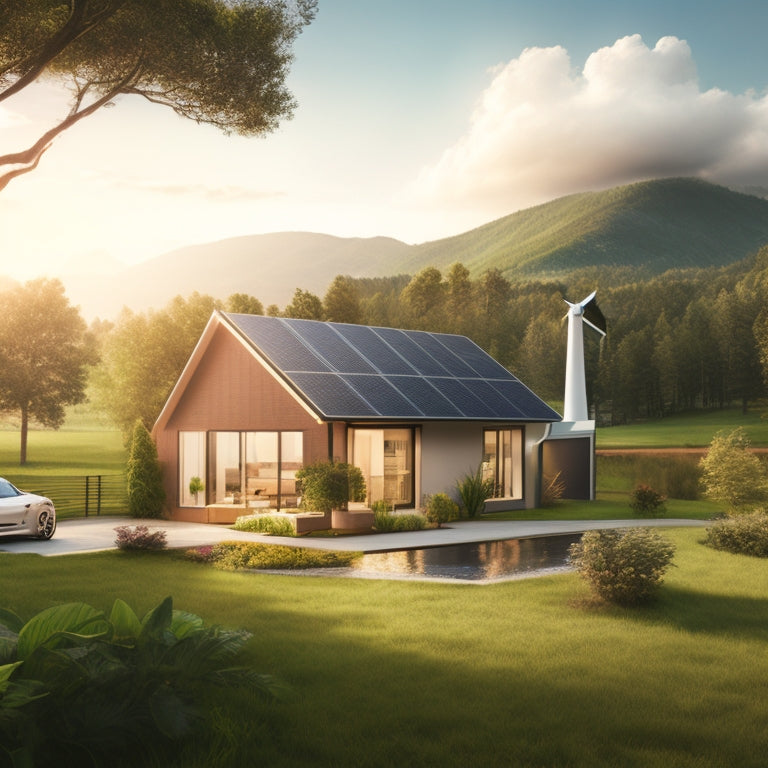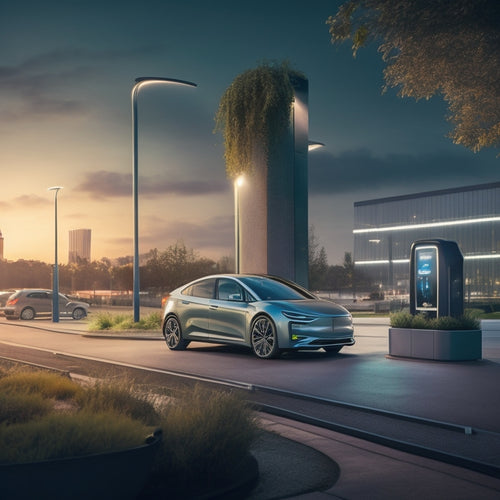
Powering Home Emergencies With Energy Independence
Share
You can rely on solar energy to power your home during emergencies, ensuring that essential appliances like lights, refrigeration, and communication devices remain operational, even when the grid fails. By incorporating solar power into your emergency preparedness plan, you'll have a reliable source of energy to maintain your daily routine. With a well-designed solar panel system and battery backup, you'll be self-sufficient during outages, reducing your reliance on external power plants and transmission lines. As you investigate energy independence, you'll uncover a range of benefits that guarantee a consistent and reliable power supply, no matter what Mother Nature throws your way.
Key Takeaways
- Solar power provides a reliable source of energy during outages, ensuring functional essentials like lights, refrigeration, and communication devices remain operational.
- Energy independence through renewable resources like solar, wind, or hydro power reduces reliance on external power plants and transmission lines, guaranteeing a stable supply.
- A properly sized solar panel system with battery backup ensures a steady power supply during extended outages, making it essential for emergency preparedness.
- Energy storage systems like battery backup solutions play a crucial role in buffering against grid outages, supporting smooth transitions, and utilizing excess energy generated during the day.
- Achieving energy independence through solar power and energy storage systems enhances emergency preparedness, reduces energy bills, and promotes sustainable living while protecting against outages and price volatility.
Why Solar Power for Emergencies
Three out of five homes in the United States experience power outages every year, leaving families in the dark and disrupting daily life.
You're probably wondering how to prepare for these emergency situations. One effective solution is to evaluate solar power for emergencies.
Solar energy advantages include providing a reliable source of power during outages, reducing your reliance on the grid, and offering a clean alternative to traditional generators.
By incorporating solar power into your emergency preparedness strategies, you'll be better equipped to handle unexpected events.
Additionally, solar panel battery backup systems enhance renewable security and allow homeowners to store excess energy generated during the day for later use, providing power during low sunlight periods or nighttime.
With solar power, you'll have the peace of mind knowing that your lights, refrigeration, and communication devices will remain functional, even when the grid is down.
Understanding Energy Independence
Freedom from the grid's unpredictability is a cornerstone of energy independence, where you're in control of your power supply. This means relying on renewable resources like solar, wind, or hydro power to generate electricity.
With energy independence, you're no longer at the mercy of grid outages or rate hikes. You've got energy security, which is critical during emergencies. By utilizing local energy sources, you reduce your reliance on external power plants and transmission lines.
This decentralized approach guarantees a stable and consistent supply of electricity, even when the grid fails. Off-grid solar power systems reduce reliance on non-renewable energy sources, contributing to a cleaner environment and lowering carbon footprints for rural homes.
Solar Panel System Essentials
You'll need to carefully consider three critical factors when designing a solar panel system for your home emergency power needs: the system's size, which directly impacts its ability to meet your energy demands; the inclusion of a battery backup, which guarantees a steady supply of power during extended outages; and the quality of the panels themselves, which affects the system's overall efficiency and lifespan.
When selecting solar panels, verify they feature durable materials and strong construction to withstand various environmental conditions.
Consider the warranty and customer support offered by the manufacturer, as a thorough warranty can protect against faulty components and workmanship.
System Size Matters
Your solar panel system's size plays a critical role in powering home emergencies efficiently. A system that's too small won't provide enough power, while one that's too large will be a waste of resources. To determine the right size, you'll need to take into account your energy usage, available roof space, and local building codes.
| System Size | System Efficiency |
|---|---|
| Small (2-5 kW) | Low - suitable for small homes or apartments |
| Medium (5-10 kW) | Medium - suitable for average-sized homes |
| Large (10+ kW) | High - suitable for large homes or commercial properties |
When evaluating system size, think about installation considerations like panel orientation, shading, and electrical infrastructure. By choosing the right system size, you'll guarantee maximum system efficiency and a reliable source of power during emergencies.
Battery Backup Options
Reliability is key in a home emergency, and a battery backup system is essential to guarantee a consistent flow of power.
When choosing a battery backup system, you'll want to take into account the type of battery technology, such as lithium technology, which offers a longer lifespan and higher efficiency.
You'll also need to decide on an inverter type, such as a string inverter or microinverter, which affects how the system operates.
- Look for a system with a high depth of discharge (DOD) to maximize energy storage
- Take into account a system with built-in monitoring and control for easy maintenance
- Choose a system with a long warranty period for peace of mind
- Verify the system is compatible with your existing solar panel system
Panel Quality Counts
Most solar panel systems comprise multiple panels, and the quality of each panel greatly impacts overall system performance.
You'll want to verify that each panel meets high standards for panel efficiency, as this directly affects how much energy your system produces. Look for panels with high-efficiency ratings, typically above 20%.
Additionally, consider the installation standards of your solar panel system. A well-installed system will optimize energy production and guarantee your system lasts for years to come.
Be sure to work with an experienced installer who follows industry-standard best practices to get the most out of your solar panel system.
Battery Backup for Homes
You're considering backup power solutions to guarantee your home remains powered during emergencies.
A reliable battery backup system is essential to store excess energy generated by your solar panel system or grid connection.
Backup Power Solutions
With the grid's increasing vulnerability to outages, homeowners are turning to backup power solutions as a safeguard against extended periods of darkness.
You're not alone in seeking a reliable alternative to traditional generators. As you investigate generator alternatives, consider the benefits of integrating renewable resources into your backup power strategy.
Some key considerations for your backup power solution include:
-
Energy storage capacity: How much power do you need to store to meet your emergency energy needs?
-
System scalability: Can your system adapt to changing energy demands or expanded renewable resource integration?
-
Grid independence: How critical is it for you to maintain power autonomy during outages?
- Environmental impact: What role do you want renewable resources to play in your backup power solution?
Reliable Energy Storage
Energy storage systems play an essential role in ensuring a reliable backup power solution for your home. They provide a buffer against grid outages, allowing you to maintain energy efficiency and independence.
With a battery backup system, you can store excess energy generated by your solar panels or wind turbines during the day and use it at night or during power outages. This setup integrates seamlessly with home automation systems, ensuring a smooth shift between grid and backup power.
Advanced energy storage solutions can also optimize energy consumption, reducing your reliance on the grid and lowering your energy bills. By investing in a reliable energy storage system, you'll have peace of mind knowing your home is protected from power outages and energy uncertainty.
Grid Independence Benefits
Reliability becomes the cornerstone of your emergency preparedness plan when you sever ties with the grid.
By doing so, you'll experience numerous benefits that enhance your overall energy independence.
Some of the most significant advantages include:
-
Energy Savings: Reduce your reliance on utility companies and lower your energy bills with sustainable living practices.
-
Increased Energy Security: Protect yourself from grid outages and price volatility by generating your own clean energy.
-
Improved Air Quality: Decrease your carbon footprint and contribute to a healthier environment by embracing renewable energy sources.
- Enhanced Peace of Mind: Rest assured knowing you're prepared for any emergency, with a reliable energy system that's always ready.
Emergency Power System Design
Three vital components form the backbone of a well-designed emergency power system: a power generation source, an energy storage solution, and a power conversion system.
You'll need to determine the right combination of these components to meet your emergency load requirements. The power generation source can be a solar array, wind turbine, or fossil-fuel generator.
Energy storage solutions, such as batteries, guarantee a steady supply of power during extended outages. The power conversion system, including inverters and chargers, manages the flow of energy between generation, storage, and your home.
Effective power management is essential to guarantee seamless shifts between grid and emergency power. By designing a system that balances these components, you'll have a reliable emergency power system that keeps your home running during outages.
Frequently Asked Questions
Can I Use Solar Power During a Grid-Wide Power Outage?
You can use solar power during a grid-wide power outage if you have a solar backup system with a battery bank, allowing you to operate off-grid systems independently of the grid, providing reliable energy when you need it most.
Are Energy Storage Batteries Safe for Home Use?
You're right to prioritize battery safety for home installations; modern energy storage batteries, like lithium-ion, are designed with built-in safety features, such as thermal management and fault detection, to minimize risks and guarantee safe operation in residential settings.
How Long Does It Take to Install a Solar Panel System?
Are you ready to utilize the sun's power? Installing a solar panel system typically takes 3-5 days, depending on the type - monocrystalline, polycrystalline, or thin-film - and the complexity of the installation process, which includes assessment, design, and mounting.
Can I Expand My Solar Panel System in the Future?
You can easily expand your solar panel system in the future, exploring solar expansion options and considering system upgrade considerations, such as adding more panels or upgrading inverters, to increase energy output and meet growing needs.
Are There Government Incentives for Energy Independence Systems?
As you're considering energy independence, you'll coincidentally find the government is on your side; you'll qualify for federal tax credits, state rebates, and renewable energy grants through energy independence programs, greatly reducing your system's cost.
Related Posts
-

Solid State Batteries in Electric Vehicles
Solid-state batteries revolutionize electric vehicles by offering a longer lifespan and higher energy density than tr...
-

Smart Home Thermostats to Revolutionize Your Space
Smart home thermostats revolutionize your space by providing precise temperature control and optimizing energy saving...
-

Solar Powered Lights for Sustainable Home Decor
Solar-powered lights offer a stylish and eco-friendly way to enhance your home decor. They capture sunlight, converti...


